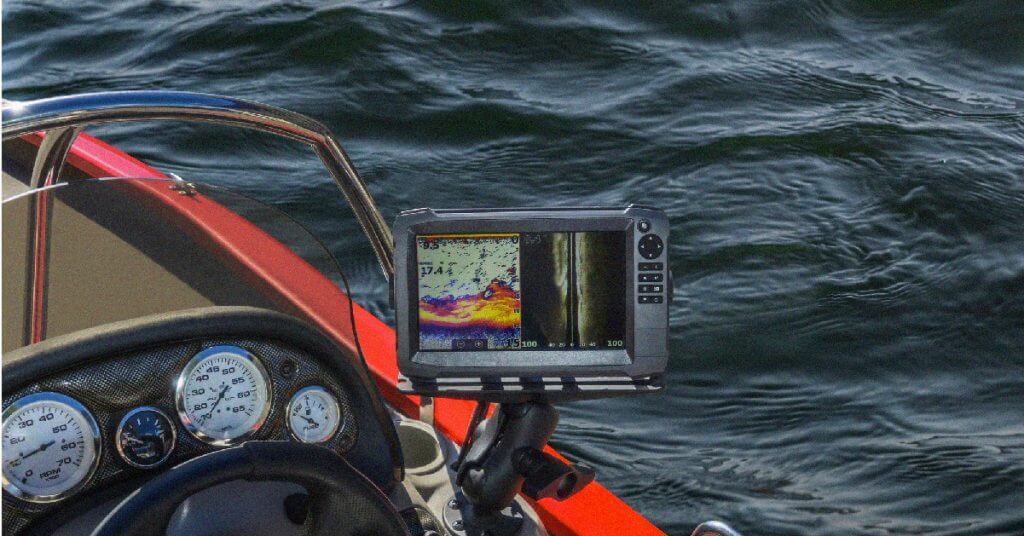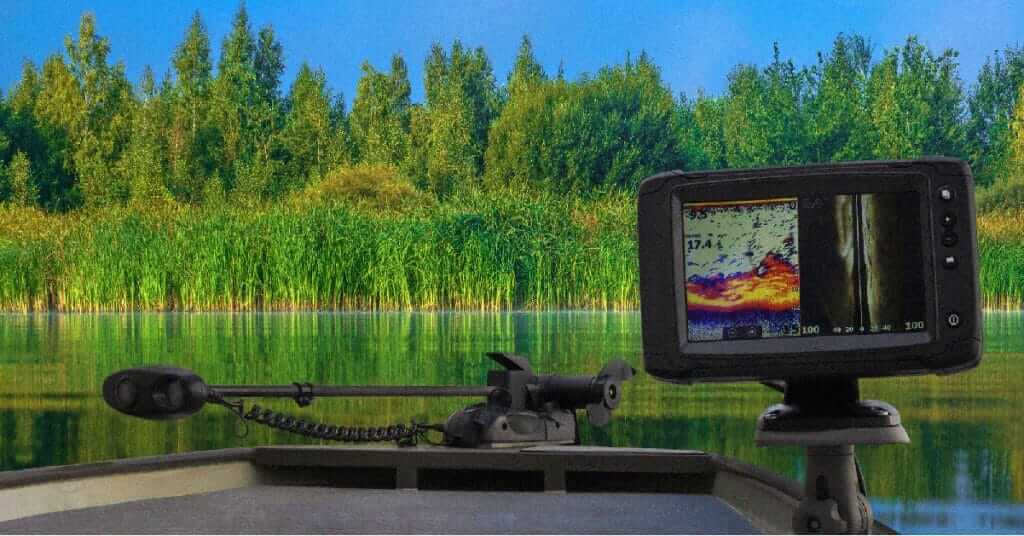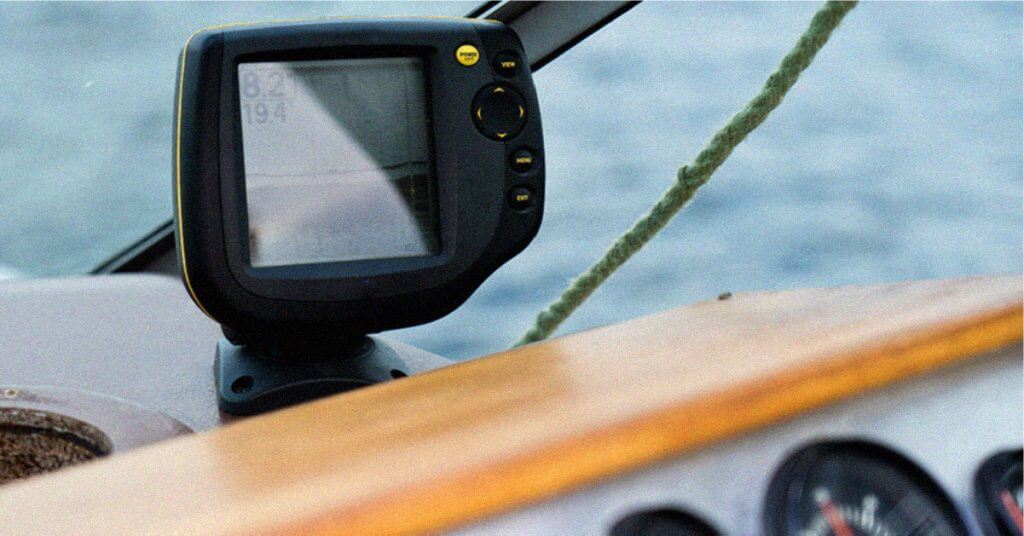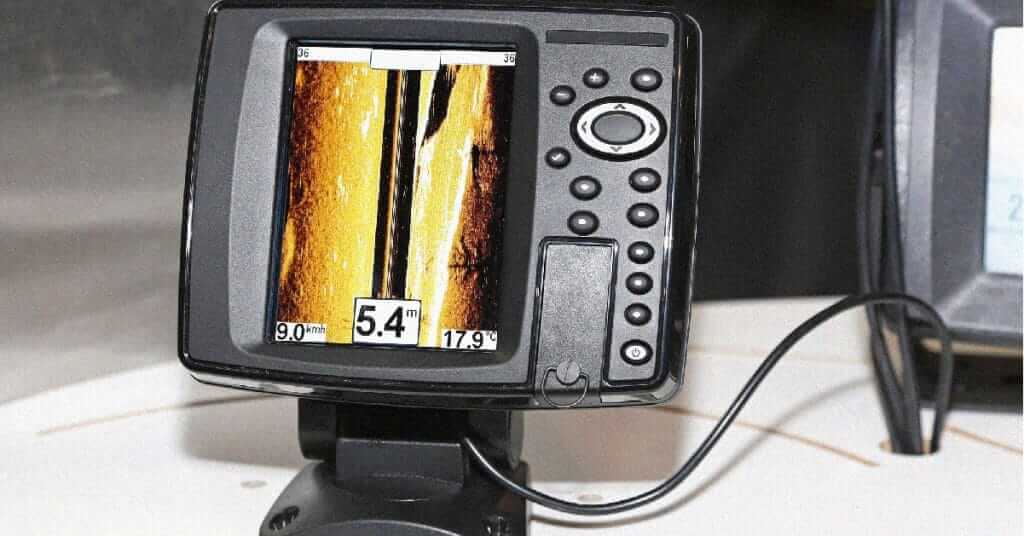A fish hunter review centered around Lowrance only makes sense, considering Lowrance is as synonymous with fish finders as the sky is with birds or food is with eating.
Lowrance is one of the most popular fish finder manufacturers on the planet, with only Garmin and Humminbird offering much in the way of competition.
The Lowrance Fish Hunter Pro also features a 3D option, both of which are somewhat outdated but by no means inefficient.
Whether or not the Fishhunter is the device for you is based on cost and how you are about owning the latest and greatest gadgets.
Keep in mind, while we’re covering the Lowrance Fishhunter Pro and 3D variations (both of which are excellent, castable fish finders), there are a few newer, more advanced competitors on the market as well.
Table of Contents
Alternatives
Of course, there are alternatives. The free market is nothing if not competitive and both Deeper and Garmin have something to say about who makes the best castable fish finders on the market.
Garmin Striker Cast
Deeper Pro + 2
Things to Consider Before Buying a Castable Fish Finder
A portable fish finder lacks the in-depth potential of a larger, in-boat fish finder, but that doesn’t mean they’re useless.
Like all fish finders, you want to avoid the cheap, easy finds and go for something capable and user-friendly. There are a few things worth taking the time to look for.
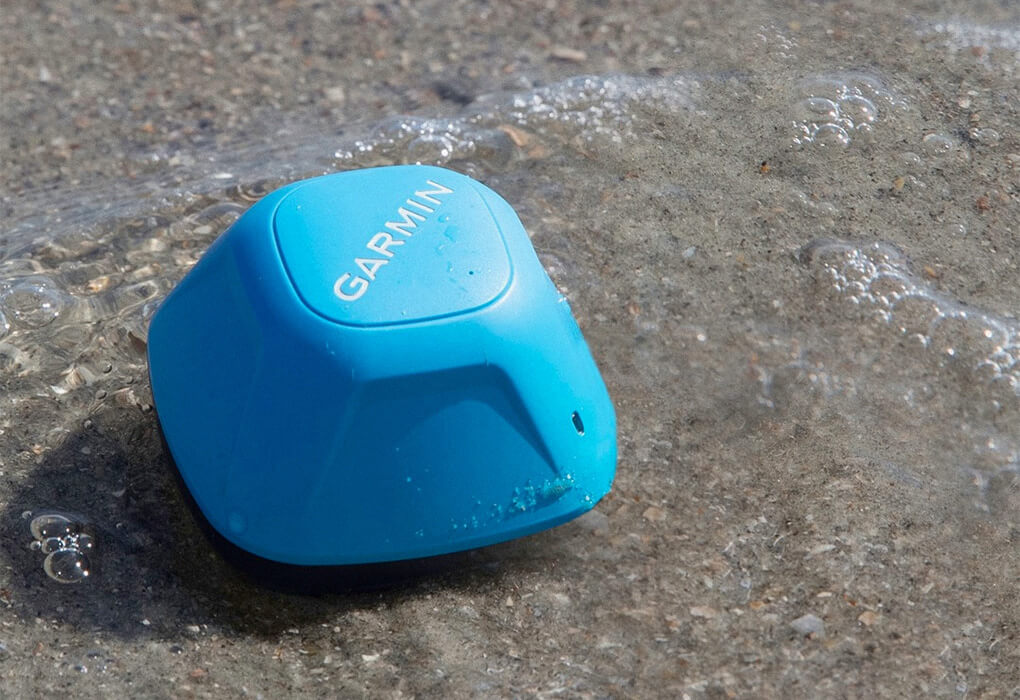
Do your homework and avoid getting burned on your first purchase.
- Look for fish finders with narrow and wide cones
- Controllable sensitivity is a good option to have
- Battery power
- Durability (the inner transducer(s) are extremely delicate)
- Ability to ice fish (depending on your location and tastes)
- Must include a mapping feature
- Versatility (kayak, shoreline, ice fishing flasher, and more)
- Weight, size, and splash (don’t wanna spook the fish)
- Casting range
- Depth
- Level of detail
- Bluetooth or WiFi (Bluetooth is more convenient, and WiFi has better range)
As you can see, that’s quite a lot to contend with. But these are complex devices, and the last thing you want is to ditch $100 on something that breaks in half the first time it hits the water.
The best casting fish finder will offer most, if not all, of the above features.
Amazingly, most of that is packed into such a tiny bobber lookalike, but that’s where you have to be careful as well.
If the bobber is too heavy (which happens when the tech is outdated and heavier inside the shell), it creates a bigger splash. That’s not something you want from a good fish finder.
Overview of the Lowrance Fishhunter Pro
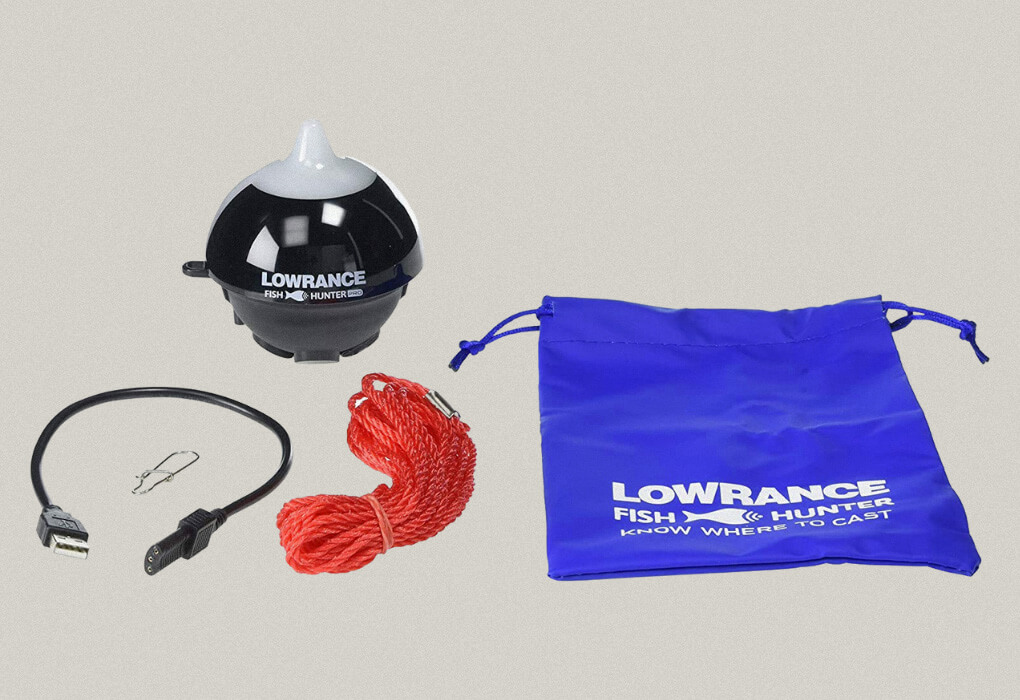
Lowrance has been in the fish finder manufacturing business for a long time, and they didn’t climb to the top of the competition by producing garbage on an annual basis.
Lowrance knows their business, and the Lowrance Fishhunter Pro is no exception to that rule.
Unlike a lot of castable fishfinders out there (presenting their devices as a bobber aesthetic), the Lowrance Fishhunter looks like an actual bobber., with a red upper half and a black lower half.
The device comes with the basics, including a carrying bag, a cord for charging (10-hour capability per charge), and a trolling rope. In terms of how it functions, it’s no different from any other castable bobber.
When you cast with the Fishhunter Pro, it bobs on the top of the water, and the transducer does its work.
It emits sonar and sends data covering everything from seabed topography to fish and temperature, directly to your smartphone.
3D Version
The 3D version is essentially an in-series upgrade of the Fishhunter Pro, including 5 transducers embedded into the device.
It includes additional features such as three-dimensional contouring, which feeds a series of different viewing options to your smartphone.
Unfortunately, the 3D version also uses WiFi, just like the Pro version.
While a 60-meter range is fantastic, WiFi connections, rather than Bluetooth, are a lot more convoluted to work with, connecting and disconnecting, on most smartphones.
Pro Version
While the Pro version lacks the three-dimensional viewing of the improved, 3D version, the Pro is still an outstanding option for shoreline anglers.
Its WiFi range is a little shorter than the 3D version as well—45 meters versus 60 meters.
The Pro utilizes a tri-frequency transducer, that emits three, separate cone widths at 381 kHz, 475 kHz, and 675 kHz. It’s not CHIRP sonar, but it’s pretty close to the base-level CHIRP tech you’ll find on in-boat fish finders.
The Pro offers a RAW view, which includes everything the sonar picks up, and a FISH view, which eliminates some of the feedback at the cost of losing some accuracy in objects below the surface.
As a portable fish finder, it has everything a beginner angler needs to get a grasp on the technology, with a RAW view and a FISH view to cover every aspect a castable is capable of.
Features and Benefits of the Lowrance Fishhunter Pro/3D
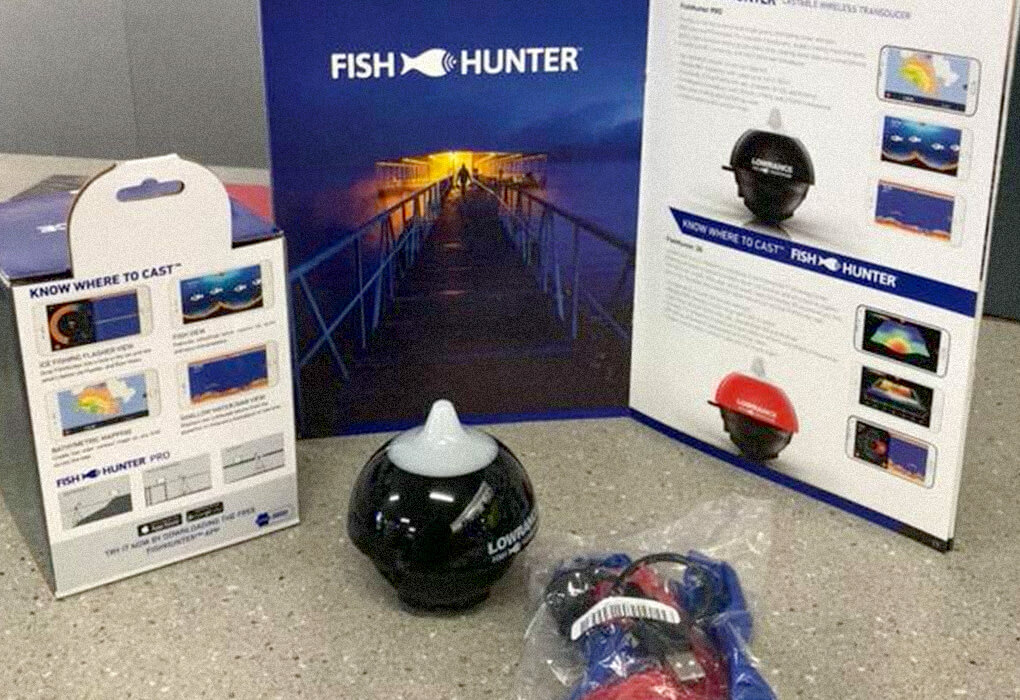
Most of the features and benefits of the Pro and 3D version (besides fish location) are the same, with the three-dimensional viewing, a little better wireless range, and price standing in as the primary, separating factors.
Everything else is pretty much in line with what you expect from a capable, castable fish finder.
Features
- 150’ to 160’ depth
- 3D Panoramic viewing (3D version)
- 3D Contouring (3D version)
- Tri-frequency for standard fishing
- Dual-frequency for ice fishing
- GPS-enabled drop pins
- Bathymetric maps
- 10-hour continuous usage
- Multiple sonar view
- Trolling capable
- -22°F temperature threshold
When it comes to features, the Lowrance fish hunter 3D offers just enough to make it the preferable choice. This is especially true for anglers new to the trade, who have difficulty reading the info the sonar sends back.
The display takes a bit of getting used to, but the fact that these devices work on your smartphone at least gives newbie anglers a sense of familiarity.
Benefits
Of course, you are always welcome to find fish the old-fashioned way, but a fish finder is a great product because it takes some of the work out of it for you and just puts you on the fish.
It gives you the ability to do what you do best, as fast as humanly possible.
Since these are highly portable sonar devices, you don’t have to spend much time worrying about how you’ll set everything up and haul your gear out there. The Fishhunter is perfectly fine in your tackle box.
It’s hard to argue with real-time feedback when all you have to do is cast. It makes it easier to fan cast, cover a wide area, and know exactly what’s down there.
With a castable, the best fishing spot is right where you are, with far more control over where you cast, while feeding you the information to let you know when it’s time to move on.
Final Thoughts
There are plenty of excellent fish finders out there for those who prefer to fish from a boat or even a kayak. I hope this Lowrance Fish Hunter review shed some light on that.
Lowrance, Garmin, and Humminbird are the leading manufacturers, offering devices like the Lowrance Hook 2, Humminbird Helix, Lowrance HDS, and Garmin Striker Vivid.
But you can’t use those on the shoreline and even in a kayak, they can get a little cumbersome.
Fishhunter was one of the best Lowrance’s fish finders and it may be getting a little out of date, but it’s still an excellent shoreline castable with portability and dependability to boot.
If you’re not sold on yesterday’s tech, the Garmin Striker Cast and the Deeper Pro + 2 are fantastic options as well, with all of the latest and greatest packed into a tiny bobber.
A good castable will put you on the fish. When you’re just trying to bring home dinner, that’s all you can ask for.
If you’re a fan of castable fish finders, drop us a comment and let us know what your favorite one is!


